Best VPN for Crypto Trading in 2025: Secure Your Blockchain Trades
Without a VPN, your crypto assets might be at risk of being hacked. Besides, a VPN can help you unblock various trading platforms. In this article, we'll introduce you to our five best VPNs for crypto trading.
Although the crypto market is booming, it’s fraught with breaches and thefts. Between 2011 and 2021, over $12 billion worth of crypto was stolen. If you’re reading this article, chances are you’re a crypto trader or you’re considering getting started. Whichever side of the aisle you’re on, you’ll need the best VPN for crypto trading to safeguard your wallet.
With a worldwide market capitalization of over $2 trillion, it’s no surprise that crypto trading is seen as a modern-day gold rush. From Bitcoin and Dogecoin to Litecoin and Ethereum, around $120 million worth of cryptocurrency is traded each day.
Many people are turning to these coins because they have been touted as private and secure digitized currencies. However, scammers and hackers track crypto IP addresses to hijack and compromise user accounts.
With a virtual private network, you can hide your IP address and encrypt your internet traffic. That said, not all VPNs are strong enough for the shark-infested waters of crypto trading, but NordVPN (our top pick) is more than up to the task. Read on to learn our five best VPNs for crypto trading.
-
10/01/2024
We adjusted the article’s VPN positions to reflect recent improvements and feature updates.
-
01/26/2025 Facts checked
We’ve added PrivadoVPN as the top free service, which also accepts cryptocurrency payments.
Top VPNs for Crypto Trading
- 1
- : PayPal, Credit card, Google Pay, JCB, UnionPay, Bitcoin, Ethereum, X-Coin
- : 10
- :
- :
- :
- :
Average speedDownload Speed90 MbpsUpload Speed9 MbpsLatency3 ms - 2
- : PayPal, Credit card, Google Pay, Amazon Pay
- : Unlimited
- :
- :
- :
- :
Average speedDownload Speed90 MbpsUpload Speed9 MbpsLatency3 ms - 3
- : PayPal, Credit card, Bitcoin, UnionPay, iDeal, Sofort, Giropay, Pixpay, Sepa Direct Debit
- : 8
- :
- :
- :
- :
Average speedDownload Speed91 MbpsUpload Speed9 MbpsLatency3 ms - 4
- : PayPal, Credit card, bitcoin, Amazon Pay
- : 7
- :
- :
- :
- :
Average speed - 5
- : PayPal, Credit card, Amazon, Paygarden, Apple Pay, Google Pay
- : Unlimited
- :
- :
- :
- :
Average speedDownload Speed81 MbpsUpload Speed9 MbpsLatency55 ms
What Makes the Best VPN for Trading?
For crypto trading, protecting your IP address should be your foremost concern. An exposed IP address is an invitation for cybercriminals and even certain governments to track your crypto-trading activities. That’s why a kill switch is a no-brainer; it cuts off your internet connection as soon as your VPN connection drops.
Further, good crypto VPNs should have IP and domain name system (DNS) leak protection. DNS leaks occur when requests are sent to your ISP’s DNS servers rather than through a VPN’s encrypted tunnel, making your IP address, browsing data and location visible to your ISP and possibly cybercriminals.
What’s more, a cryptocurrency-trading VPN should have a strict no-logs policy so that if governments subpoena them, there’ll be nothing to show. In totalitarian countries such as China where crypto is illegal, you’ll need obfuscated servers to conceal your VPN use. Be sure to always check if VPNs are legal in your location, since some VPN users in Tibet and Xinjiang have reportedly been jailed.
Also, look for security features like Onion over VPN and double VPN, which add an extra layer of security to your internet traffic.
Is There a VPN For Crypto That Accepts Bitcoin?
Here are a few VPNs that accept bitcoin as payment:
The 5 Best Crypto VPN Services
In this section, we’ll delve deep into each of the VPN for crypto providers on this list. We’ll walk you through the key features that make them excellent for crypto trading and we’ll touch on their weaknesses (if any).
1. NordVPN — Best VPN for Crypto


Very Fast

Very Fast

Very Fast
NordVPN takes first place on our list, thanks in large part to its suite of specialty servers. Onion over VPN servers, for example, route your internet activity through the Tor network.
You can use the double VPN servers to hide your crypto traffic behind two servers instead of one, while the obfuscated servers make it nearly impossible for anyone to know you’re using a VPN.
In addition, NordVPN comes with an automatic kill switch and leak protection. If you plan to mine cryptocurrency, you’ll love the fast speeds that come with NordLynx, NordVPN’s version of the WireGuard protocol.
Add that to the fact that you get access to over 5,400 servers in 60 countries and you have a VPN that’s excellent for unblocking crypto trading on any platform.
Buy and Sell Crypto Safely With Threat Protection
NordVPN’s threat protection feature is built to fend off trackers and intruders before they can cause any harm. It works by warning you each time you’re about to visit a suspicious website. It also scans and deletes all malware-ridden files you download and blocks intrusive ads and pop-ups. Read our NordVPN review to discover more.
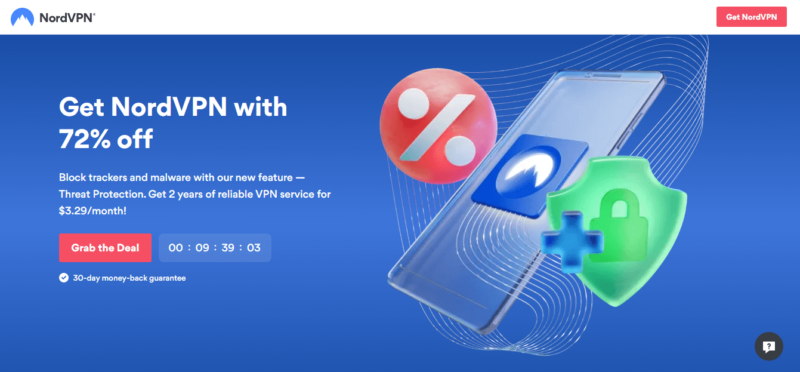
NordVPN’s monthly plan isn’t cheap, but you get a steep discount if you sign up for the two-year plan. All plans come with a 30-day money-back guarantee. NordVPN accepts various cryptocurrency payments through CoinPayments.
- **VAT may apply
- Unlimited GB
- 10
- Yes
- *The prices are charged in the first billing cycle only. Renewal prices vary.
- Unlimited GB
- 10
- Yes
- *The prices are shown only apply for the first 12 months.
- Unlimited GB
- 10
- Yes
- **The prices are applicable only for the first 24 months. Secure, high-speed VPN Threat Protection Pro™: Anti-malware and advanced browsing protection Threat Protection Pro™: Ad and tracker blocker Password manager with Data Breach Scanner 1 TB of encrypted cloud storage Identity and SSN monitoring and alerts Credit monitoring services Up to $1M in identity theft insurance Up to $100K in cyber extortion insurance
- 10
2. Surfshark — Best Budget Crypto VPN


Very Fast

Very Fast

Very Fast
If you’ve read some of our other reviews, you’ve probably noticed that Surfshark often claims the “most affordable” spot, as you can see in our best VPNs listing. However, there’s more to this reliable VPN service than pricing. Aside from a kill switch and DNS leak protection, you get a set of interesting features to protect your privacy while trading.
First on the list is the CleanWeb feature, which blocks ads, trackers and phishing sites. The NoBorders and camouflage modes are useful if you’re trading in totalitarian countries where VPNs are forbidden. In addition, Surfshark is backed by a strict no-logs policy, ensuring that your trading data is never collected by the VPN.
Make Your Crypto Transactions Extra Secure With MultiHop
MultiHop, Surfshark’s version of a double VPN, routes your internet traffic through two servers to encrypt your traffic twice and help you trade securely. The only downside is that you have about 14 server combinations to choose from.
Fortunately, as part of a new feature known as Nexus, Surfshark has introduced a dynamic MultiHop feature, which allows you to choose your own country combinations.

Surfshark’s one-year and two-year plans are some of the cheapest out there. For payment, you can either use CoinGate or CoinPayments to pay with Bitcoin, Ethereum and Litecoin. All plans come with a 30-day money-back guarantee.
- Unlimited GB bandwidth, Unlimited devices, Secure VPN, Ad blocker, Cookie pop-up blocker. Pricing for the annual and biennial plans only apply for the first payment. Renewal fees vary.
- Unlimited GB
- Unlimited
- Yes
- Everything in Starter, plus Antivirus protection, Identity protection, Email Breach and Credit Card Alerts, Online Alias Pricing for the annual and biennial plans only apply for the first payment. Renewal fees vary.
- Unlimited GB
- Unlimited
- Everything in One, plus Data removal Pricing for the annual and biennial plans only apply for the first payment. Renewal fees vary.
- Unlimited GB
- Unlimited
3. ExpressVPN — Best User-Friendly VPN for Crypto
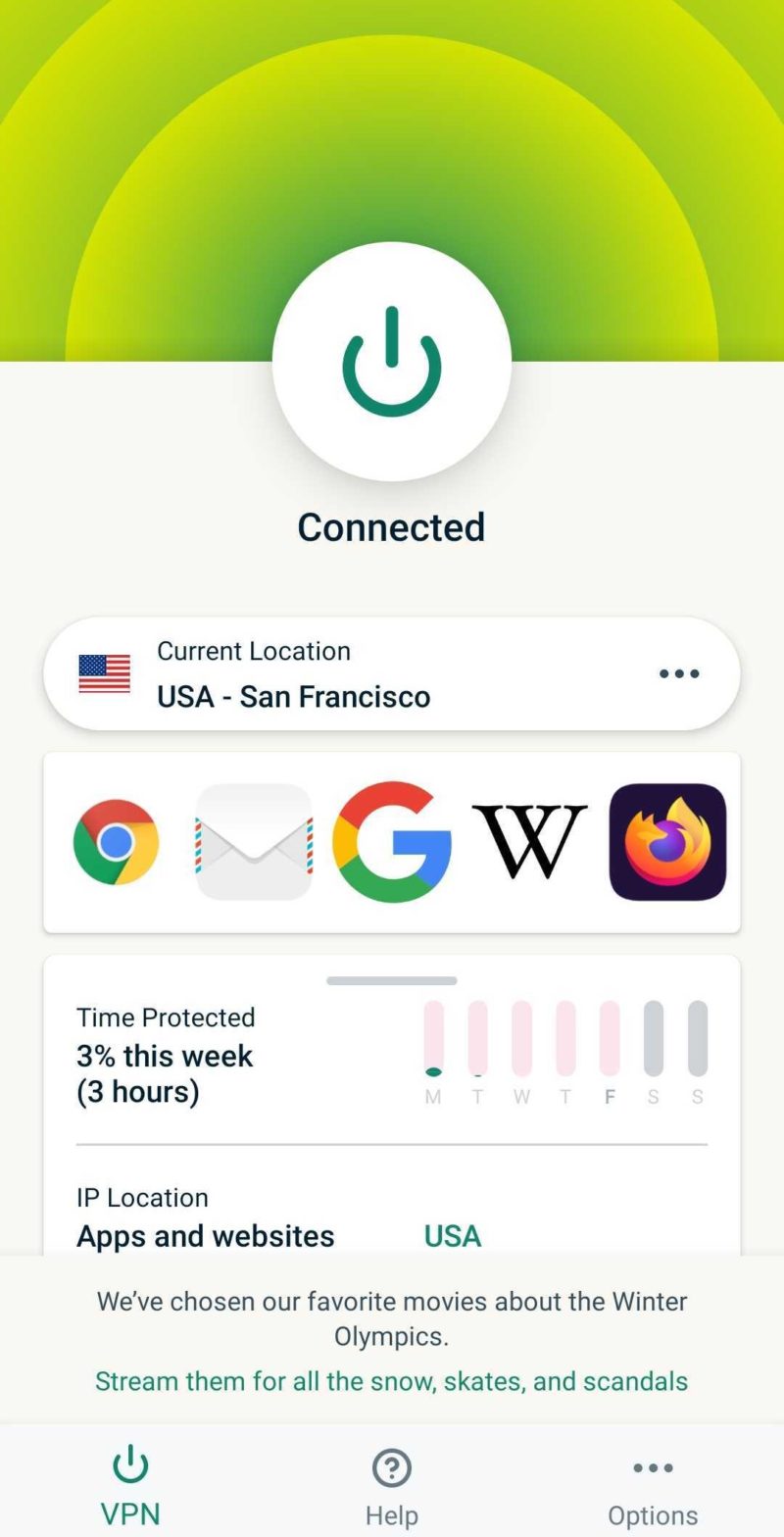

Very Fast

Very Fast

Very Fast
ExpressVPN takes third spot in this roundup because of its excellent security, ease of use and fantastic speeds. It has impressive download and upload speeds, especially when using the Lightway protocol, making it a good choice as a crypto VPN.
In addition, this VPN service has an automatic kill switch known as network lock, which is available on Windows, Mac, Linux and routers. On top of all that, you get access to a massive server network with over 160 server locations.
Further, ExpressVPN provides extensive leak protection (DNS, IP and WebRTC), so you don’t have to worry about your data being exposed. The threat manager, included with your subscription, stops websites and apps from recording your online activity and sharing it with third parties.
Protect Your Crypto Wallet Using Trusted Server Technology
With TrustedServer technology, all of ExpressVPN’s traffic runs on RAM-only servers. This means that operating systems and apps never write on the hard drive and all your data is wiped with every reboot. This technology ensures that no record of your cryptocurrency transactions is kept on its servers.
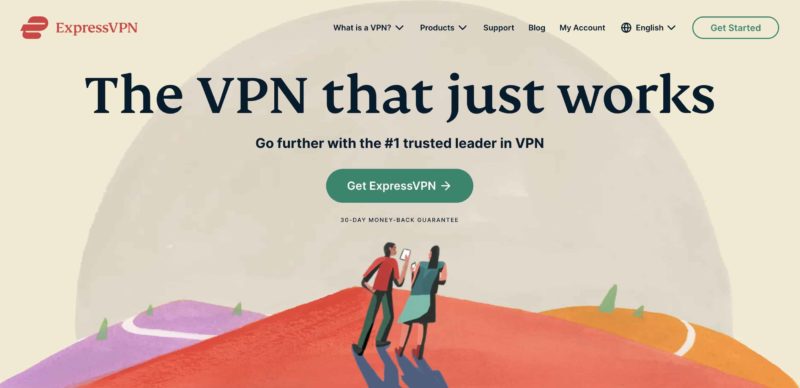
your crypto exchanges are kept secure.
ExpressVPN’s pricing plans are expensive, but you can soften the blow to your wallet with its long-term plans. All plans come with a 30-day money-back guarantee. ExpressVPN accepts Bitcoin through a wide range of wallets. It also accepts Ethereum and XRP, as well as the PAX, BUSD, USDC and GUSD stablecoins.
4. CyberGhost
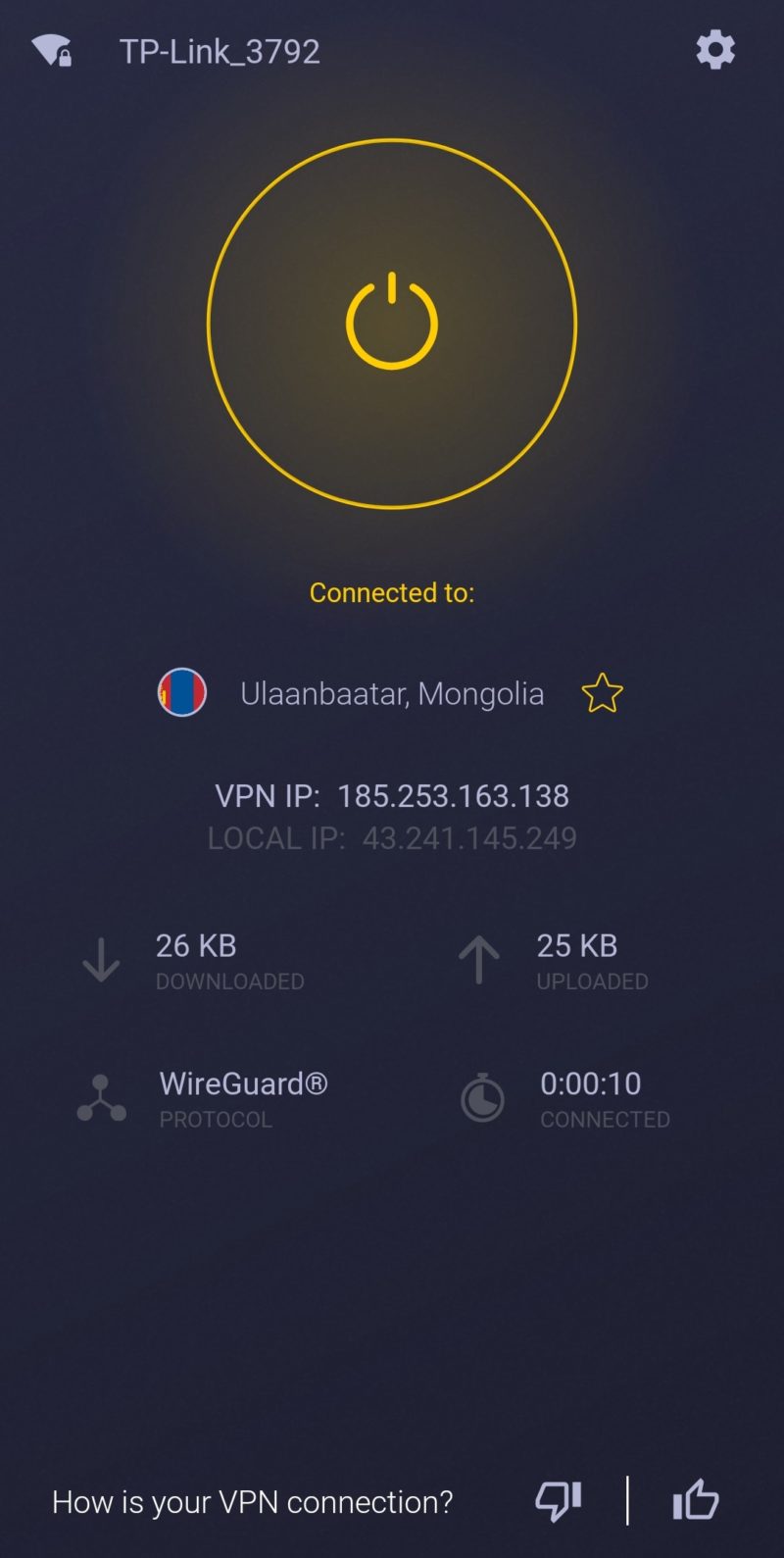
the service an excellent choice for beginners.



CyberGhost has the most servers of any VPN on this list, with over 7,800 servers in 91 countries. This makes it an excellent choice for sneaking past geoblocks and keeping tabs on your crypto wallet, even in countries where your trading platform is banned. Although its speeds are not as consistent on OpenVPN, you get stable connections on the IKEv2 and WireGuard protocols.
There’s also a kill switch and DNS leak protection, both of which ensure that your IP is always hidden. In addition, CyberGhost’s apps are extremely easy to use and you can automate your VPN experience with the “smart rules” feature.
For example, you can set up your device to connect to CyberGhost each time it connects to a public WiFi network. Learn more about this VPN service in our CyberGhost review.
Avoid Being Blocklisted by Trading Platforms With a CyberGhost Dedicated IP Address
A VPN normally assigns multiple users the same IP address, and might cycle a user through several IP addresses in a single day. Some trading platforms will block your access when they notice that you use multiple IP addresses. Further, your IP might be blocked if an unscrupulous character uses it — a phenomenon known as the bad neighbor effect.
A dedicated IP address helps you stay off blocklists, and you’ll avoid annoying extra verification steps like CAPTCHAs when trading crypto. However, with CyberGhost, you’ll need to pay extra for a dedicated IP.
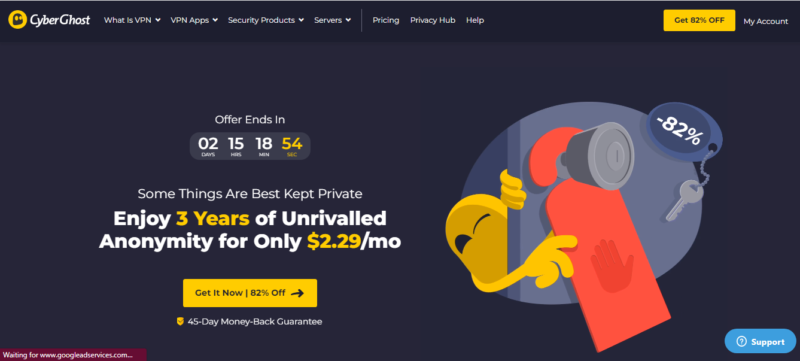
CyberGhost’s two- and three-year plans are affordable and you get a 45-day money-back guarantee, so it’s worth a try. You can pay using Bitcoin, Ethereum and Bitcoin Cash through BitPay.
5. Private Internet Access
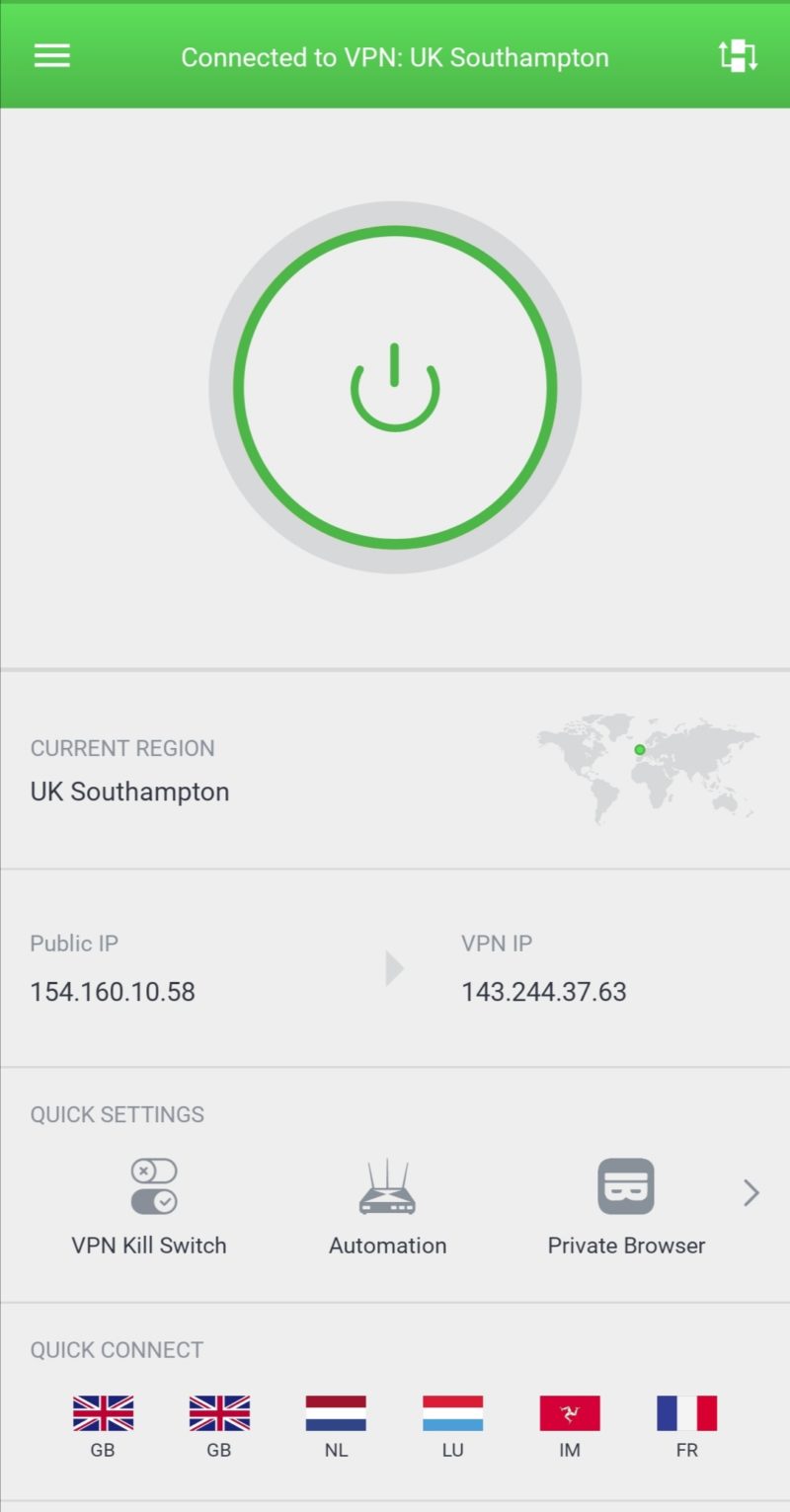
you subscribe to its three-year plan.

Very Fast

Very Fast

Fast
Although it’s not as fast as the others, Private Internet Access (PIA) earns a spot on this list, thanks to its trove of security features. Aside from the standard AES-256 encryption, you get access to a kill switch, which protects your data, and the VPN is backed by a strict no-logs policy.
PIA has servers in 84 countries, with a lot of servers in the U.S., so it’s a good choice for people who use crypto platforms there.
You can also use the dedicated IP address feature to avoid blocklists and constant security warnings. One standout aspect of this reliable VPN service is that it’s easy to use and customize. That’s why it makes our best VPN for beginners list.
What’s more, you can connect up to 10 devices with a single PIA subscription. Read our PIA review to learn more.
Protect Your Crypto Wallet With MACE
Developed by PIA, MACE blocks ads, trackers and malware like many other ad blockers. However, it does that in a unique way. Instead of blocking requests from a tracking server, it sends the DNS request to your local IP address. As a result, MACE is faster and more memory-efficient than ordinary ad blockers.
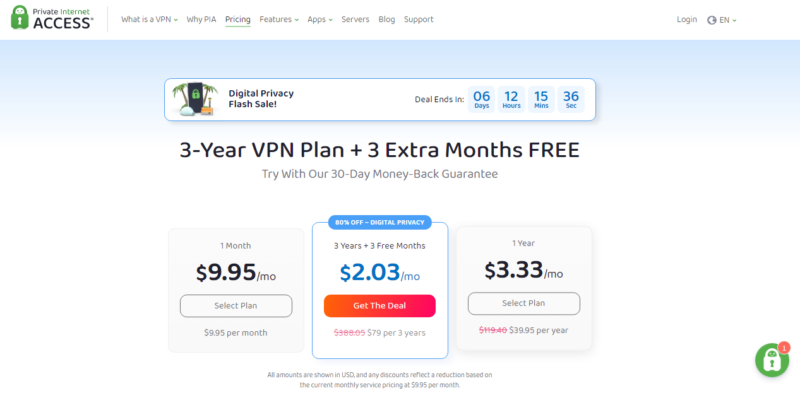
PIA is cheap, especially with the three-year plan. You can pay with BitPay, Bitcoin, Bitcoin Cash, Ethereum and Litecoin, and there’s a 30-day money-back guarantee with each plan.
Why You Need a VPN for Crypto Transactions
Crypto trading is becoming increasingly risky because of hackers and scammers. A virtual private network (VPN) hides your actual IP address and encrypts your internet traffic, making it difficult for anyone to track your crypto exchanges. What’s more, features like a kill switch and leak protection provide a safety net in case your VPN connection drops.
Further, a double VPN feature encrypts your connection twice, making it even harder for snoopers to get access. If you’re in a heavily restricted country, a VPN can use obfuscation to hide the fact that you’re using a VPN. All in all, VPNs safeguard your crypto wallet and transactions.
Do I Need to Use a VPN for Mining Crypto?
You don’t need to use a VPN for mining crypto, but a VPN ensures that your data remains encrypted to snoopers and helps you avoid data and bandwidth throttling from your internet service provider (ISP) with a VPN. Finally, with a VPN, you can unblock geo-restricted cryptocurrency trading exchanges to trade more coins.
Can I Use a Free Crypto-Trading VPN?
A free VPN may help you trade crypto anonymously, but there are some caveats. Some free VPNs are malware-ridden and they might log your data to sell to advertisers. You also might experience data and bandwidth throttling.
That said, if you are on a tight budget, we recommend PrivadoVPN. It’s one of the rare trustworthy free VPNs and comes with a no-logs policy.
The Risks of Using a VPN With Crypto Exchanges
While using a VPN is legal in most cases, it’s not without risk. For example, Binance’s terms of service prohibit U.S. residents from using a VPN, so your account could be suspended if you’re caught. Residents of the United States can use Binance.US, though the available cryptos are limited. Learn more in our full Binance review.
Others, like Coinbase and Crypto.com, do not explicitly forbid VPNs in their user agreements, but be sure to enter accurate information when filling in their forms — otherwise, your account could be suspended.
Trading platforms, due to know-your-customer and anti-money laundering laws, want to ensure that there are no unscrupulous activities. In a similar fashion, decentralized exchanges do not ban VPNs outright, but the key is to use a VPN that can’t be detected.
Is Using a VPN to Buy Crypto in New York Legal?
There is no indication that VPNs are illegal for buying crypto in New York. However, the state has strict regulations for crypto assets since its introduction of BitLicense in 2015, and popular exchanges like Binance.US don’t work there. Be sure to double-check with your trading platform before making crypto purchases in New York.
Final Thoughts
Cryptocurrency trading is all the rage these days, but with an influx of scammers and hackers, there’s no telling when your crypto wallet might be targeted. That’s why VPNs are a must-have, whether you need a VPN for Coinbase or Robinhood.
From our testing, NordVPN comes in first place, providing fast, anonymous and private crypto trading thanks to its excellent security and encryption features. If NordVPN seems interesting to you, you can check it out risk-free and claim a refund within 30 days if you’re not satisfied.
Which crypto trading platforms do you use? Have you tried using VPNs to access a trading platform? Which ones gave the best results? Share your thoughts with us in the comment section below, and as always, thanks for reading.
FAQ
Many VPNs, including NordVPN, Surfshark, CyberGhost and ExpressVPN, accept Bitcoin as payment. Some also accept Bitcoin Cash and other cryptocurrencies.
A VPN hides your IP address, ensuring that fraudsters can’t track your cryptocurrency transactions. Further, a VPN encrypts your internet traffic so that even if a snooper manages to access your data, they’ll only see scrambled codes.
You can use a VPN on decentralized exchanges without worrying about being banned because they are censorship-resistant. Since there’s no single owner or controller, governments typically can’t monitor or ban cryptocurrency transactions on a decentralized exchange.
Absolutely. A VPN adds an extra layer of privacy by giving you an anonymous IP address. And if your VPN is secure, your purchases are even harder to trace.


